Republic P-47D Thunderbolt 44-19925
377.Squadron,362.Fighter group,9.AF
2./Lt. Frederick Wilder Turner
Štědronín, okr. Písek 29.4.1945
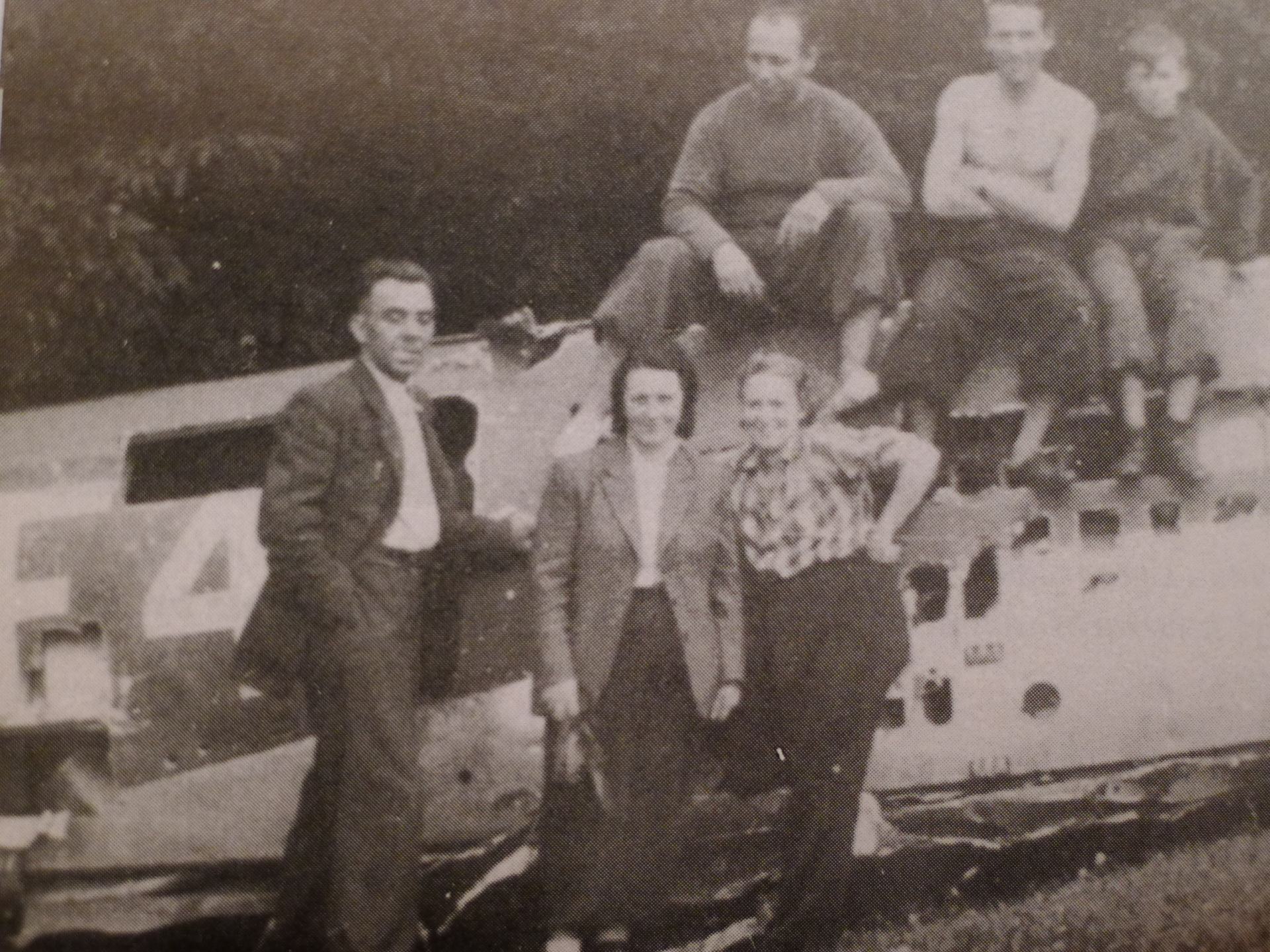
Místní obyvatelé u vraku P-47 Lt. Turnera
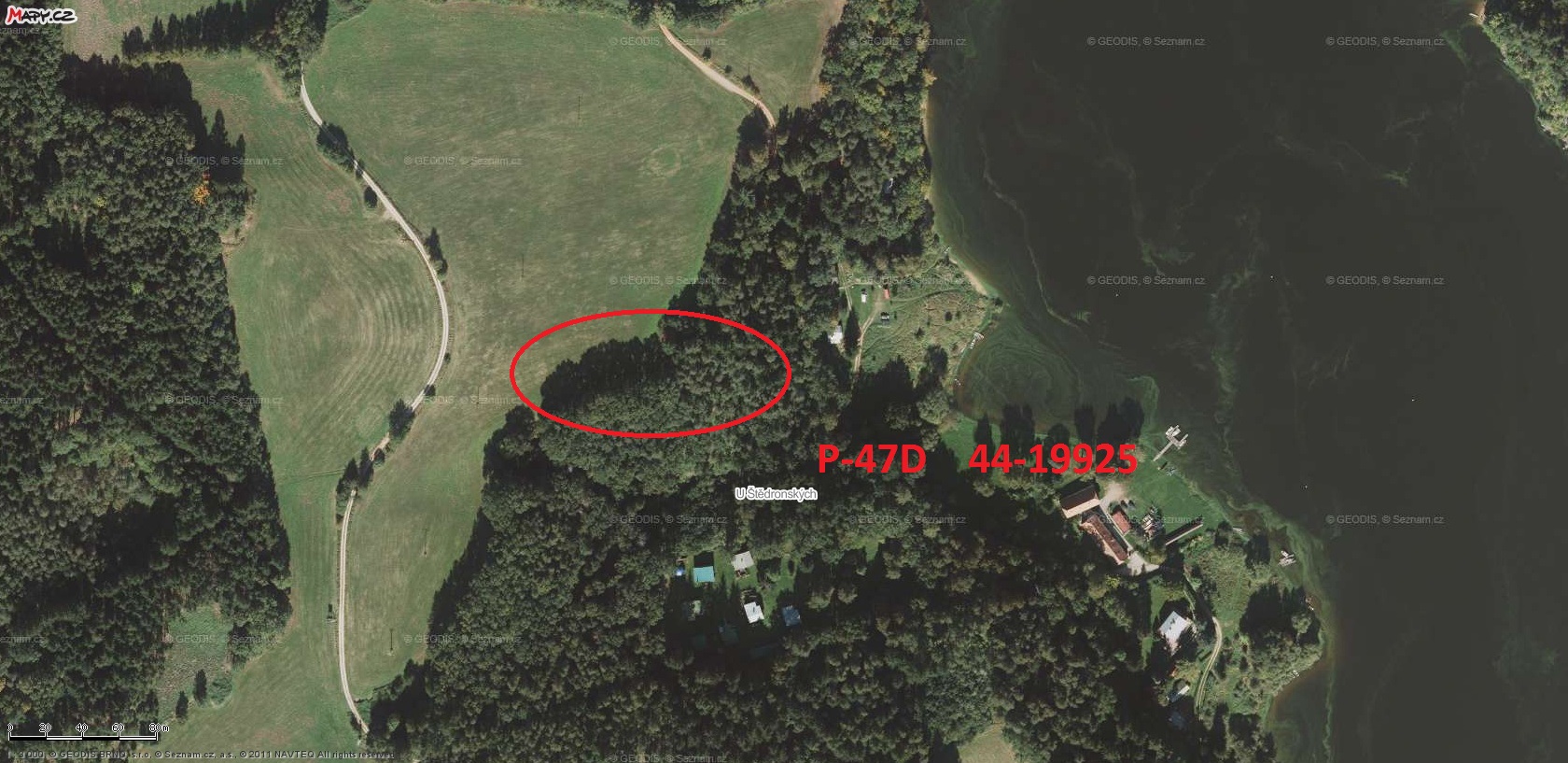
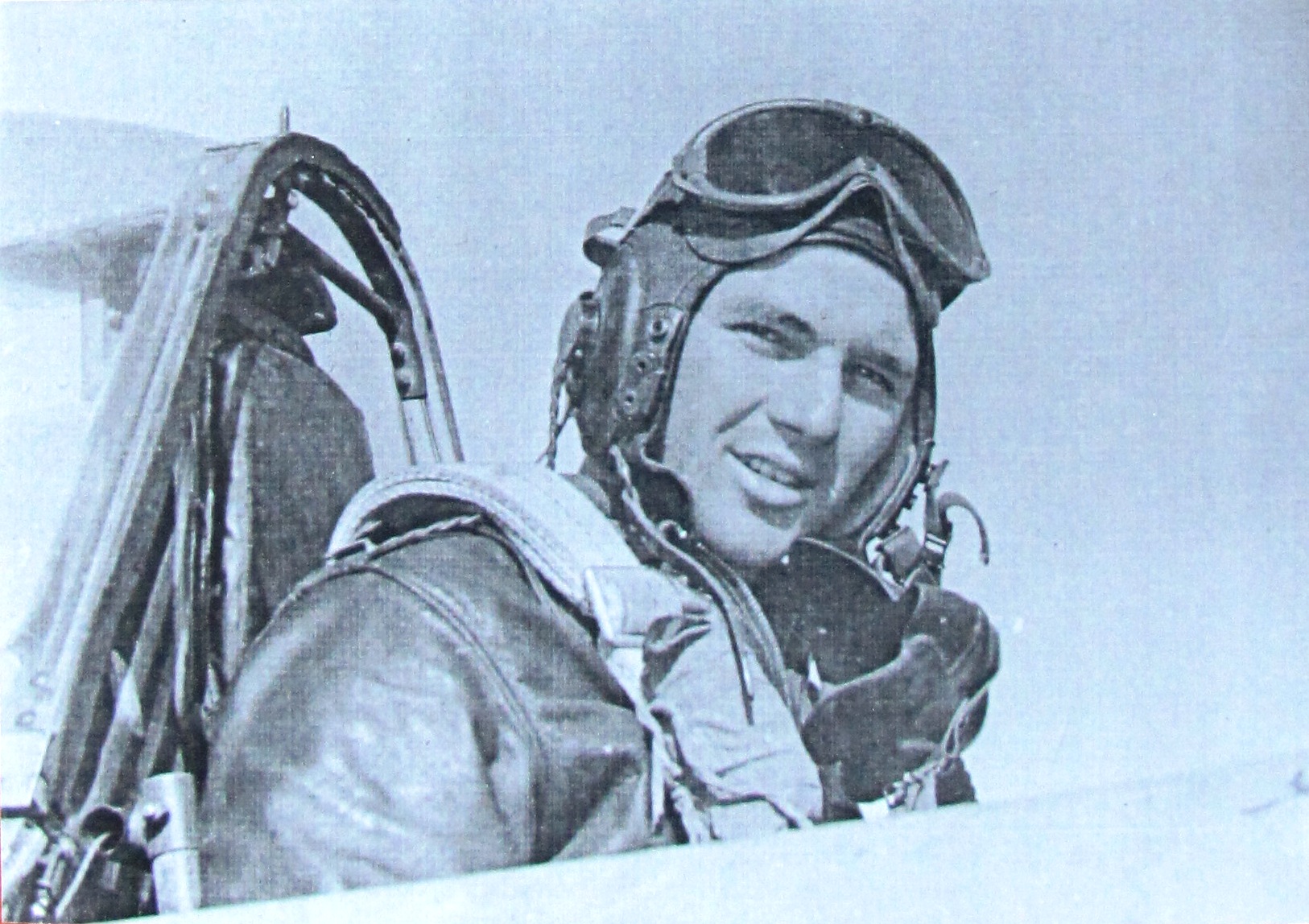
2/Lt. Frederick W. Turner /via Vl. Kos/
Městečko Mirotice na Písecku 29.dubna 1945. Od rána zde panuje čilý ruch, přes město prochází a projíždí transport německého civilního obyvatelstva promíchaný s vozidly a vojáky Wermachtu. Ze vzduchu to vše vypadá jako shromaždiště vojska, takže tato aktivita upoutává pozornost spojeneckých letců. Během dopoledne je podniknut útok několika letadly, zasaženo je několik vozidel, zničeno několik stavení. Na letadla je několikrát vystřeleno z protiletadlových kanonů, takže domněnka o shromaždišti vojsk je potvrzena. V 11:30 se objevuje prvních dvanáct letounů a začínají likvidovat vše, co se v Miroticích a okolí jen trochu podobá nepříteli. Bombardování a ostřelování probíhá až do 17. hodiny. Výsledkem je zničené městečko, 16 obětí z řad místních obyvatel a neznámý počet německých vojáků a civilistů z transportu.
Během náletu je palbou ze země zasažen stroj P-47D Thunderbolt ser. 44-19925 pilotovaný 2./Lt. Frederickem W. Turnerem. Letoun ze svazku 9. AF, 362 Fighter Group , letí na pozici "Green 3" ze čtyřčlenné letky. Pilot ještě stihne rádiem ohlásit přípravu na nouzové přistání, pak už o něm zbylí členové flightu neslyší. Letoun sráží vršky stromu u obce Štědronín a tvrdě naráží na pole před lesem. Pilot letoun okamžitě opouští a mizí v nedalekém lese…Konec války je na dosah, letoun zůstává na místě, je postupně rozebírán obyvatelstvem a nakonec odvezen do šrotu.

Telegram, který obdrželi rodiče Lt. Turnera, ve kterém je jim oznámeno, že jejich je syn nezvěstný.
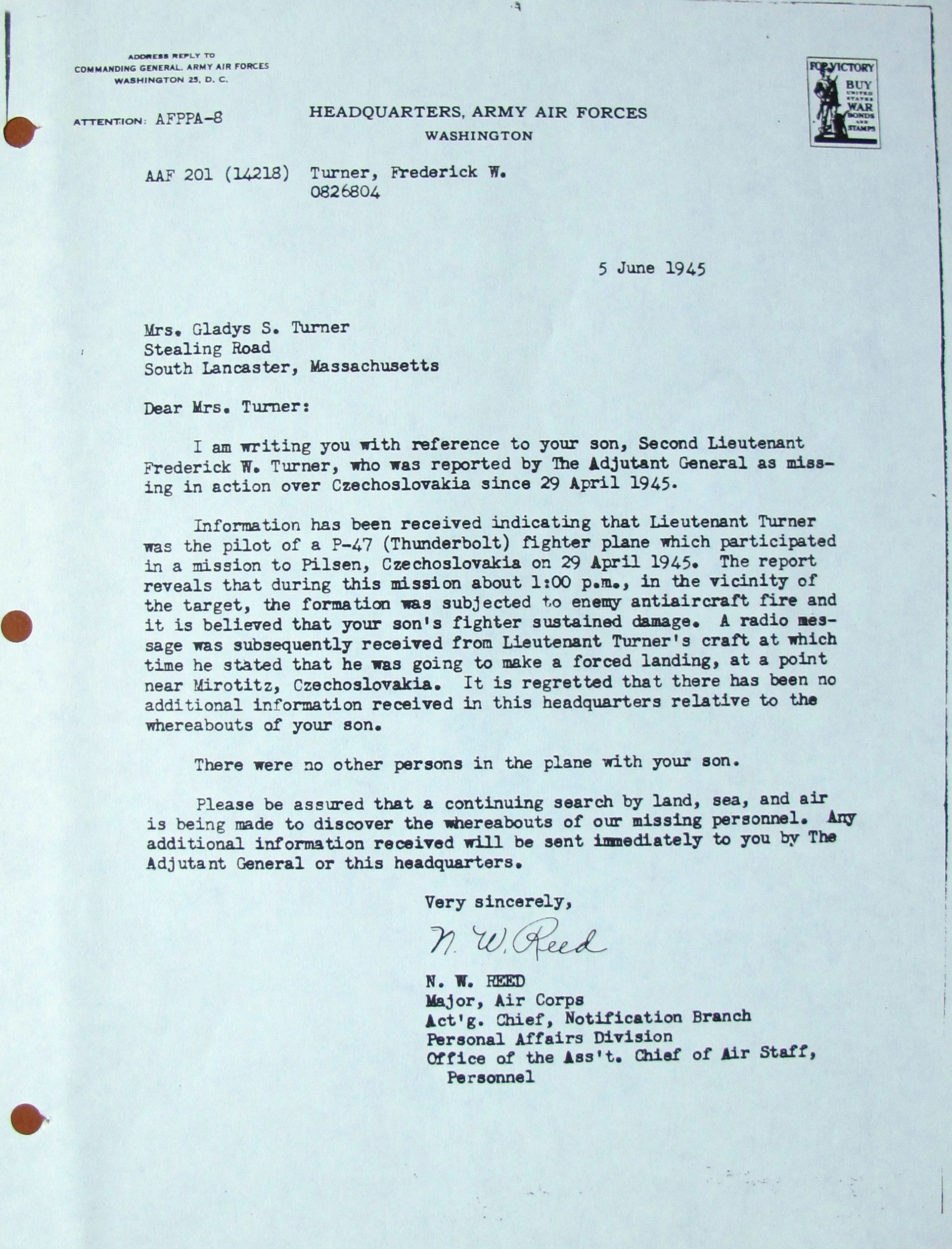
By Lt. Frederick Wilder Turner
The order came through from headquarters the morning of the 29th of April, [1945] to get every available plane into the air to repel a counter attack reported about 25 miles south of Prague. The 377th squadron got 22 planes into the air about 10:30 a.m. as soon as the weather broke, and set course for the target area. Major Gyer lead the squadron with Captain Hayes, Lt. Clark and I leading the other flights. Two planes aborted because of engine trouble and landed at an emergency air strip near Nuremburg. Gyer located a large concentration of trucks and men and radioed his flight into bomb formation and the squadron started to give the town a good working over. I gave my flight the word to arm their bombs and we peeled off from about 8000 feet. I started strafing on the way down to keep the Hun’s in their foxholes away from their guns. At about 1000 feet, as I released my bombs, I got hit square in the engine, knocking the prop governor out. I pulled out trying to hold the decrease switch to control the prop from running away. I got up to about 2000 feet going due west when I started checking the instrument [panel]. The oil pressure dropped steadily so I figured I would have to bail out or set down real quick. I took the second choice rather than making a beautiful target hanging in a chute, a couple of miles from the town we had just been putting the heat on. Looking down I decided there was not much in the way of fields, so I headed for what looked like a potato patch near a couple of houses. I cut all the switches and locked the shoulder harnesses. The field looked about 300 feet long with tall pines on the approach I had to use. I went into the trees at about 180 miles an hour, fifty yards short of the field. The plane hit the ground on what was left of the left wing. Evidently the impact knocked me out for half a minute or so, I got out of my chute and started to climb out. Four men were approaching my plane from the other side of the field, as soon as they saw me they started shooting. I jumped out and dove into the brush and rolled down a hill about a hundred feet long. After running at least a couple of miles, I had to quit, no wonder, I still had my oxygen mask hooked up! I dug a hole and buried my helmet and oxygen mask, put my gun inside my flying suit and started walking toward home with only a couple hundred miles to walk out of enemy territory. I figured on getting as much distance between myself and that plane as possible before things got to hot. I walked till dark, getting my bearings from the sun. It turned out to be a bright moonlit nite, so I kept walking till about 4 o’clock in the morning. The sun woke me up about 8:00 a.m. when I figured I’d picked a “good” spot to stop. It was a small patch of woods on top of a hill with a main road on either side. I knew it would be to risky to try to cross a main road in daylight, so I made the best of it and dried my socks and shoes and took it easy. There was not much traffic to speak of but I figured on playing it on the safe side. About sundown it clouded up and started snowing. I had no compass, so without the stars for direction, it would have been senseless to travel and further. I took out my jackknife and cut down a couple of pine trees and built myselg a leafy chateau. I crawled inside and shivered till morning came. It continued to snow and showed no sign of stopping. About now I started to feel hungry and all I had was 14 cigarettes (Chesterfields). That was fine, but all I lacked were the matches. There wasn’t2 much I could do all day, so now my Boy Scout training talent started to come out. I took the rawhide from my 45 holster and made a bow from a piece of green wood and proceeded to make a fire by friction. Finally I got the thing hot enough to light a cigarette so it wasn’t all in vain. About 9:00 p.m. it cleared and I got my bearing from the stars and started out again. My third day of travel went ok and I made good time. Keeping to the woods I ran into woodmen occasionally and I didn’t have trouble getting by them. The sun was warm and the snow melted fast, making it pretty sloppy walking. About every ten miles I’d spot a forest-fire lookout tower and climb up to see what lay ahead. The first time I climbed one of these towers I had a ringside seat of a flight of P-47’s dive bombing a town about five miles from where I lay. Now I know how the Krauts felt when we were giving them a bad time. What a racket! I walked all the third night, making good time till it clouded up and started to snow again. The next day I kept to the woods [and] much to my disappointment, the territory seemed to be very familiar. I knew then, I’d traveled in a huge circle the night before when I came to a brook I’d gotten a drink from. Well, I took another drink and started on my way. It was warm and I hadn’t been getting much sleep at night because of the cold, so I spent about half a day in the sack, without the sack. I got on my sore feet again and took a hitch in my belt and started out. It turned out to be clear that night, so I walked till sunup. The day was warm and I got a chance to dry my shoes and stockings, or that is, what was left of them. I took my sweater and cut the sleeves out of it to make stockings or a reasonable facsimile from them. After five days without anything but a few cigarettes, I noticed I was slowing down quite a bit. I started for the west again, as Horace Greeley once advised the young men of his time. About 10:00 that nite it started raining so I got up my nerve and tried a few barns without much luck. Each time I’d run into a place that was either locked or had a dog. Long after midnite, I finally got into a barn with beaucoup hay. I woke up about 5:00 a.m. when the farmer decided to throw some hay down to his cows. He came close but stopped short of uncovering me. I slept all that sixth day and night and got up the minute the rooster started crowing and hit the road. After walking a few hours, I ran square into two German soldiers in the woods. I stopped about 20 feet short of them and hit the dirt. Their backs were to me so I pulled out my 45 and figured if they turned and saw me I’d start shooting. My luck was running good because they both walked straight away from me without even turning around. It was a good break for me cause I probably couldn’t have hit either of them with the seven shots I had. Well it seemed my luck was good; it gave me new hope that I’d make our lines o.k. That nite I came to a main high way with a lot of traffic. Most of it was horse drawn. The Germans must have been out rounding up all the horses for miles around, because for over an hour a steady stream of horses went past me with all kinds of guns and equipment. I crossed as soon as it was clear and walked till sunup. I flopped down again and slept for about half the day. That afternoon I got shot at by about ten S.S. Troopers when I tried to cross a dirt road. I retraced my tracks for about two miles and lost them somehow. Luck was still with me but good!3 I took out my little stick I’d been using to keep track of the days on and cut the seventh notch in it. That afternoon I came to a small village of about a dozen homes. The woods came up to within 50 yards and I hoped on picking up something to eat. A flock of ducks looked good so I figured on waiting till dark, hoping to clobber one of them. About dark, a farmer started to drive them in for the nite. As luck would have it, he overlooked one little duck. I waited about 10 minutes and took out after the duck. I sneaked up to within five feet or so and he spotted me, he took off like he was ruptured. I chased him around in circles for about 15 minutes till he started to squawk like mad and I had to give it up in fear of the farmer hearing me. I walked half a mile and found a hay stack and dug in for the nite. I must have invaded some character’s home, because once an hour I’d feel something moving around in there with me and I’d give a good swift kick and whatever it was would keep quiet for another hour. I couldn’t see the sun when it came up so it was almost 9:00 a.m. when I poked my head out. I waited till it was clear and made for the woods again. I took out my stick and cut the 8th notch in my stick and took another hitch in my belt thinking about that duck I almost had. The morning went fast and I made a few more miles before I stretched out in the sun for a rest. About a half an hour after starting out again I ran smack into a woodsmen before I saw him. He started asking me questions which I didn’t understand, so I simply walked away, shaking like a lear with my hand on my gun in case he followed me. He didn’t, that the Lord. Before it got dark, I sat down in the woods and took off my shoes to dry them out. Just then I saw a woman with two kids walking toward me. I got behind a tree forgetting my shoes and they passed without seeing me or my shoes. I just didn’t feel like meeting anyone. That night it turned colder that any previous night I’d spent in the woods, I tore apart a woodpile and tried to make a shelter to cut the wind. It didn’t turn out too successful so I lay on my back and shivered all night long. Both my shoulders bothered me more that night than ever. Evidently they took all the strain when I crashed. The 9th day I cut a notch in my stick and started out. For the past couple days I had been getting closer and closer to shelling so it gave me new hope. That afternoon it started to rain again so I started hunting for shelter. I came to a large hill so I figured on climbing to the top to see what lay ahead. Every time I came to a hill I had hope that good news lay on the other side. The top of the hill didn’t have any good news so I stole some bark that a farmer had stripped from a birch tree. It made good shelter and I stayed there till dark when it quit raining. While I lay shacked up in that birch bark leanto, I heard what sounded like an assembly call on a bugle, anyway there was a lot of traffic on the road about a half a mile from the hill where I was and everything seemed to be headed for a small town about two miles away. I was a clear night and I walked till after midnite. I tried to get a little sleep but it was to cold. Bright and early I cut the 10th notch in my stick and started walking. Things were getting rough now as I could only walk about 10 minutes then sit down and take a rest. About noon I was ready to lie down and wait for the front lines to come to me. There was a small town a couple away and after watching it for half an hour, I saw what looked like about six tanks leave the town and go down the road. It was the first time I’d4 seen and tanks move around out in the open during my hiking, so I figured that they might be our own. Even if they weren’t I couldn’t travel much further, so I made up my mind to go into the town anyway. The best place to go I figured was a large building on the outskirts of the town, so I started out. I spotted a tank on the edge of a field by the house and went in that direction. About half a mile from it I could see for sure that it was American and as soon as I saw a star on the front I almost did a back flip for joy. I walked up and asked the sergeant if he knew where I could get something to eat. He had an amazed look on his face but as soon as I told him the story he told me to pile into the tank and he’d drive me to Headquarters. Plenty happened that day and all good news to me. The 704 Tank Destroyer outfit I had just come in contact with had spear-headed sixty miles the night before and it happened to be the 8th of May and the War had just come to a halt. It was sure one day I’ll never forget for a long, long time to come. The boys really treated me swell, maybe to good, because I had three shots of cognac and two fried eggs within half an hour after they picked me up. Right about then I doubled up in a little ball on the floor and figured I’d die. Nothing but a bad case of indigestion. All I had to do now was soak my beat up feet and gain back about 20 pounds I’d lost. (This is where my father ended his story. Though his words are not always eloquent, they are his own and it is his story in the rough) (Below are notes that I believe were written by my mother. I believe that it was her intention to help him edit and rewrite his story for later publication.) Notes on page one; I had almost full throttle on and could feel the engine practically tearing itself to pieces. In a frantic effort to get every possible mile out of the engine before it quit completely, I tried to conserve the engine as much as possible by not running it at too high a speed. Flying at a speed of 150 M.P.H. losing about 200 ft a minute when the engine cut out completely. I pumped the throttle several times and manage to get one more good burst from the engine before it froze up completely, twisting the engine practically off its mounts. My face and hands were damp with sweat as I automatically cut the switches and shut off the gas which I hoped would prevent the plane from taking fire when it crashed. By npw the trees were looming in sight and I trust my left hand down on the shoulder harness in a vain effort to lock my body to the seat to prevent myself from being thrown against the instrument panel. As I hit the treetops I mechanically put down the flaps to lesson my speed before hitting the ground. I felt the branches of the trees being sliced away and then my left wing was sheared off close to the fuselage. From then on everything happened so fast that my next sensation was being thrown against the left side of the cockpit with a terrific force.
Materiály poskytnuté Vl. Kosem
V roce 2009 , kdy se poprvé dostávám na místo havárie, je z letounu možné nalézt již jen několik drobných fragmentů. O to větší radost pak ale mám z kompletní žaluzie kapoty motoru, kterou jsem nalezl opodál. Z letounu se tato část pravděpodobně utrhla během dojezdu po zemi, když stroj vytvářel v poli hlubokou brázdu, na níž si vzpomínají i pamětníci. V žaluzii je velké množství vypálených děr, pravděpodobně od střepin granátu, který musel explodovat v bezprostřední blízkosti.
Na místě dopadu v r. 2009
Drobné fragmenty nalezené v r. 2009
Žaluzie motoru stroje Lt. Turnera poznamenaná explozí granátu
Aktualizace 09.2020
Pan D. Tomajer zaslal výňatek z knihy Thunderbolts Triumphant, The 362nd Fighter Group vs Germany’s Wermacht, který je zajímavý hned ze dvou hledisek. Jednak je na snímku zatím zřejmě jediný známý snímek stroje Lt. Turnera / Thunderbolt vzadu/ , a také v popisku pod fotografií přináší informaci, že Lt. Turner byl během akce dne 29.4.1945 zabit. Ověřením v jiných zdrojích byla ale tato informace vyvrácena. Lt. Turner zahynul v roce 1951 při letecké havárii, když pilotoval letoun Národní Gardy.
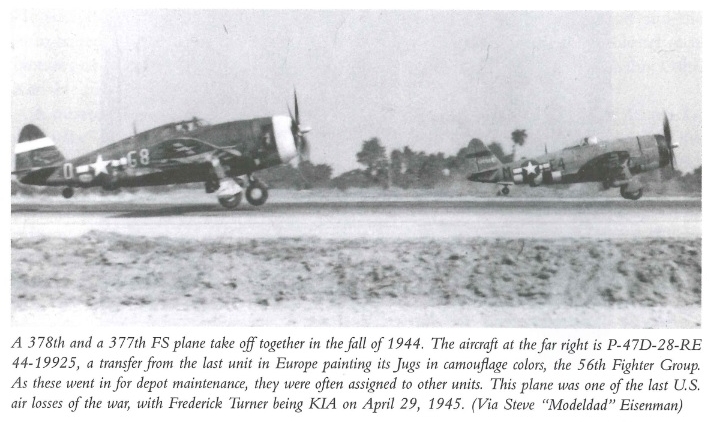
Pavel Krejčí 1.2014, 9.2020
